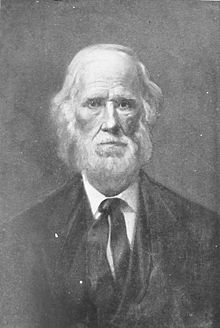Dr. J. G. M. Ramsey | |
|---|---|
 Portrait of J. G. M. Ramsey by artist Lloyd Branson | |
| Born | James Gettys McGready Ramsey March 25, 1797 Knoxville, Tennessee, United States |
| Died | April 11, 1884 (aged 87) Knoxville, Tennessee, United States |
| Resting place | Lebanon-in-the-Fork Cemetery 35°57′37″N 83°50′49″W / 35.96029°N 83.84708°W |
| Alma mater | Washington College |
| Occupation(s) | Physician, businessman, planter, slave owner, historian |
| Notable work | The Annals of Tennessee (1853) |
| Political party | Democratic Party |
| Spouse | Margaret Crozier |
| Children | Elizabeth Ramsey (Breck) John Crozier Ramsey William Wilberforce Ramsey Margaret Ramsey (Dickson) Francis Alexander Ramsey Robert Ramsey Henrietta Ramsey (Lenoir) J.G. McKnitt Ramsey Charlotte Ramsey Arthur Ramsey Susan Ramsey (Alexander) |
| Parent(s) | Francis Alexander Ramsey and Peggy Alexander |
James Gettys McGready Ramsey (March 25, 1797 – April 11, 1884) was an American historian, physician, planter, slave owner, and businessman, active primarily in East Tennessee during the nineteenth century. Ramsey is perhaps best known for his book, The Annals of Tennessee to the End of the Eighteenth Century, a seminal work documenting the state's frontier and early statehood periods. Ramsey was also a major advocate for development in East Tennessee, leading efforts to bring railroad access to the region, and helping to organize the region's first medical society.[1]
As the son of a prominent Tennessee statesman, Ramsey encountered as a child many of the state's important early political figures, giving him a unique historical perspective on the state's early years.[2] After his father's death, Ramsey began compiling a vast collection of historical documents related to the state's Watauga, Franklin, and Southwest Territory periods. After years of exchanging advice and notes with fellow historian Lyman Draper, Ramsey published the 700-plus page Annals in 1853. While the book has been praised for its attention to accuracy and factual detail, modern historians have criticized it for its lack of historical inquiry and its overemphasis on biography and warfare.[2]
A lifelong states' rights Democrat, Ramsey supported the Confederacy during the Civil War, and as a Confederate treasury agent, he was forced to flee Knoxville under an armed guard ahead of the city's Federal occupation in 1863. While the war left his family and finances in ruins, Ramsey nevertheless returned to Knoxville in the early 1870s, and gradually rebuilt his fortune. His funeral procession in 1884 was the largest ever witnessed in Knoxville until that time.[2]
- ^ Lisa Oakley, James Gettys McGready Ramsey. Tennessee Encyclopedia of History and Culture, 2002. Retrieved: 29 July 2010.
- ^ a b c William Masterson, "J. G. M. Ramsey: Historian of Early Tennessee." Introduction in Ramsey's The Annals of Tennessee to the End of the Eighteenth Century (Johnson City, Tenn.: Overmountain Press, 1999), pp. xiii-xxix.